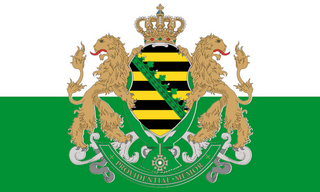Related Research Articles

Lower Saxony is a German state in northwestern Germany. It is the second-largest state by land area, with 47,614 km2 (18,384 sq mi), and fourth-largest in population among the 16 Länder federated as the Federal Republic of Germany. In rural areas, Northern Low Saxon and Saterland Frisian are still spoken, albeit in declining numbers.

Saxony, officially the Free State of Saxony, is a landlocked state of Germany, bordering the states of Brandenburg, Saxony-Anhalt, Thuringia, and Bavaria, as well as the countries of Poland and the Czech Republic. Its capital is Dresden, and its largest city is Leipzig. Saxony is the tenth largest of Germany's sixteen states, with an area of 18,413 square kilometres (7,109 sq mi), and the sixth most populous, with more than 4 million inhabitants.

Dresden is the capital city of the German state of Saxony and its second most populous city after Leipzig. It is the 12th most populous city of Germany, the fourth largest by area, and the third most populous city in the area of former East Germany, after Berlin and Leipzig. Dresden's urban area comprises the towns of Freital, Pirna, Radebeul, Meissen, Coswig, Radeberg and Heidenau and has around 790,000 inhabitants. The Dresden metropolitan area has approximately 1.34 million inhabitants.

Saxony-Anhalt is a state of Germany, bordering the states of Brandenburg, Saxony, Thuringia and Lower Saxony. It covers an area of 20,451.7 square kilometres (7,896.4 sq mi) and has a population of 2.17 million inhabitants, making it the 8th-largest state in Germany by area and the 11th-largest by population. Its capital and most populous city is Magdeburg.

The Evangelical Church in Germany, also known as the Protestant Church in Germany, is a federation of twenty Lutheran, Reformed, and United Protestant regional Churches in Germany, collectively encompassing the vast majority of the country's Protestants. In 2022, the EKD had a membership of 19,153,000 members, or 22.7% of the German population. It constitutes one of the largest Protestant bodies in the world. Church offices managing the federation are located in Herrenhausen, Hanover, Lower Saxony. Many of its members consider themselves Lutherans.

A joint-stock company (JSC) is a business entity in which shares of the company's stock can be bought and sold by shareholders. Each shareholder owns company stock in proportion, evidenced by their shares. Shareholders are able to transfer their shares to others without any effects to the continued existence of the company.

The Landtag of Saxony, also known in English as the Saxon State Parliament, is the legislature of the Free State of Saxony, one of Germany's sixteen states. It is responsible for legislation, control of the government, and electing some state officials. The Landtag has existed in various forms since 1831, but the current body was established during German reunification in 1990. The Landtag is directly elected and has a term of five years.
Freedom of religion in Germany is guaranteed by article 4 of the German constitution. This states that "the freedom of religion, conscience and the freedom of confessing one's religious or philosophical beliefs are inviolable. Uninfringed religious practice is guaranteed." In addition, article 3 states that "No one may be prejudiced or favored because of his gender, his descent, his race, his language, his homeland and place of origin, his faith or his religious or political views." Any person or organization can call the Federal Constitutional Court of Germany for free help.

Sohland an der Spree (German) or Załom is a municipality in the district of Bautzen in Saxony, Germany near the border of the Czech Republic in a region called Lusatia. The river Spree flows through the village. Together with some smaller villages it constitutes one of the biggest villages or communities with about 7,700 inhabitants. The most iconic monument of the village is the "Himmelsbrücke" ; it is said that the bridge will break when someone tells a lie while standing on it.

Bergstadt Lößnitz, sometimes also called Muhme (“Aunt”) for its age, is a town in the district of Erzgebirgskreis, Saxony, Germany, and belongs to the Town League of Silberberg. Its name comes from the Slavic lesnice, meaning “forest place”.
A statutory corporation is a government entity created as a statutory body by statute. Their precise nature varies by jurisdiction, but they are corporations owned by a government or controlled by national or sub-national government to the extent provided for in the creating legislation.
The Evangelical Church of the Church Province of Saxony was the most important Protestant denomination in the German Province of Saxony, also known as Prussian Saxony (1816-1944) and state of Saxony-Anhalt. As a united Protestant church, it combined both Lutheran and Reformed traditions. On 1 January 2009 the church body merged with the Evangelical Lutheran Church in Thuringia into the Evangelical Church in Central Germany.

The Tharandt Forest is a landscape in the centre of the German Free State of Saxony and lies southwest of the forest town of Tharandt, south of the town of Wilsdruff, roughly between the cities of Freiberg and Dresden. Administratively it is fully part of the borough of Tharandt today and bears a legally-protected strapline with the text: Tharandter Wald – schönster Wald Sachsens, which goes back to the tourist advertisements of the 1920s.

The forests of Germany covers 11.4 million hectares, 32 percent of the total area of the country.
A private forest is a forest that is not owned by municipal authorities, church authorities or the state. It can refer to woodland owned by a natural or juridical person or a partnership.It is the forest which is planted, nurtured or conserved in any private land.
The Minister-president is the head of state and government in thirteen of Germany's sixteen states.
The Lessing Prize of the Free State of Saxony is a German literary award. It was founded in 1993 by the Government of the Free State of Saxony and is awarded every two years. It consists of a main prize, which honours outstanding achievements in the spirit of Gotthold Ephraim Lessing, especially in the field of literature, literary criticism and the theater. This prize is worth 20,000 euros. In addition, two further "promotional prizes" are awarded, which seek to publicly recognize and promote promising beginnings in these fields. These prizes are each worth 5,500 euros.

Philipp Hartewig is a German politician for the FDP and since 2021 member of the Bundestag, the federal diet.

Freie Sachsen is a far-right monarchist, autonomist, and secessionist movement within the German State of Saxony. It seeks to restore the former Kingdom of Saxony through an autonomist government or a "Saexit if Necessary".
The Office for the Protection of the Constitution of Saxony-Anhalt is an intelligence service and the state authority for the protection of the constitution in Saxony-Anhalt, based in Magdeburg. Organizationally, it is a department in the Ministry of the Interior and Sport of Saxony-Anhalt. Its tasks are to combat extremism and espionage, for which it also uses intelligence resources. For this purpose, it had 111 posts/jobs and 814,000 euros at its disposal in 2019.
References
- ↑ e.g. the Interessentenforst Schwalingen Archived 2015-05-28 at the Wayback Machine
- ↑ "REVOSax Landesrecht Sachsen - SächsWaldG". www.revosax.sachsen.de. Retrieved 2024-03-28.